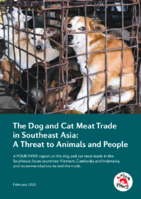
Siem Reap Becomes the First Province to Ban Dog Meat in Cambodia
FOUR PAWS applauds local government for reacting to its year-long investigations
8 July 2020 – One of Southeast Asia’s most iconic tourist attractions is making major strides for the country’s millions of dogs. After global animal organisation FOUR PAWS revealed the suffering of an estimated three million dogs slaughtered for meat in Cambodia each year, the Siem Reap Provincial Department of Agriculture, Forestries and Fisheries published a letter on 6th July banning the slaughter and trading of dogs for meat in the province. FOUR PAWS has been working closely with the Cambodian government since 2018, advocating for a ban on dog meat due to the extreme animal cruelty involved and public health risk, largely due to rabies and the spread of zoonotic diseases. The recent developments are seen as a crucial turning point for animal welfare in the region.
During nationwide investigations, FOUR PAWS identified Siem Reap province as a key hot spot in the country’s dog meat trade, responsible for the large-scale sourcing and trafficking of dogs to supply the demand for dog meat in the Eastern part of the country, most notably Cambodia’s capital Phnom Penh. The province’s dog meat trade is of considerable magnitude, involving upwards of 7,000 dogs per month, most of them ending up in slaughterhouses where they are drowned en masse. Until recently, the brutal trade has continued unabated despite consumption being a controversial practice, with less than 12% of Cambodians regularly consuming the meat, according to a FOUR PAWS market reserach.
Tourist attraction Siem Reap as lynchpin for Cambodian dog meat trade
During FOUR PAWS’ investigations, a total of 21 restaurants serving an estimated 2,900 dogs per month were visited in the Siem Reap city area alone – several of them located close to the world-famous temple complex Angkor Wat. One dedicated dog slaughterhouse and five high-volume holding and trading areas were also located in the province, used to hold dogs prior to being transported for slaughter. Specialised minivans equipped with cages are used to regularly transport at least 3,750 live dogs per month out of Siem Reap to slaughterhouses in Kampong Cham, Kampong Thom and Skun. Here the dogs are drowned, stabbed, or hanged, stripped of their fur and sold by wholesalers to the more than 100 dog meat restaurants in Phnom Penh.
The business with stolen dogs
According to FOUR PAWS research, the dog meat trade is a profit driven industry in Cambodia, with a live dog fetching between €1.80 and €2.70 per kilo, while a kilo of raw meat is sold for up to €3.60. Individual dog meat dishes cost less than one Euro. Men make up the majority of consumers who tend largely to eat the meat as a bar snack with friends, accompanied by alcohol. Women who eat dog meat, on the other hand, tend to eat dog meat at home, and for purported medicinal reasons. Both pet and stray dogs routinely enter the trade – many are snatched from pagodas and the streets, as well as stolen from their homes.
FOUR PAWS’ fight against the dog and cat meat trade
In Cambodia, FOUR PAWS partners with local charity Animal Rescue Cambodia to improve companion animal welfare, as well as with the Cambodian Mine Action Centre – a Cambodian government department – to end the dog meat trade. To put a sustainable end to the brutal dog meat trade in Southeast Asia, FOUR PAWS has launched a campaign on an international and national level in Cambodia, Indonesia, and Vietnam. “Through educational work and cooperation with the responsible authorities, local communities and the tourism industry, FOUR PAWS’ goal is for Governments in Southeast Asia to introduce, strengthen and enforce animal protection laws, which will bring an end to the capture, slaughter and consumption of dogs and cats. This will not only protect animals – but people as well from public health risks,” says Dr Karanvir Kukreja, veterinarian and Project Manager for FOUR PAWS’ Ending the Dog and Cat Meat Trade Campaign. Furthermore, FOUR PAWS supports local animal welfare organisations and communities with humane and sustainable stray animal care programmes. FOUR PAWS is also part of the animal welfare coalitions DMFI (Dog Meat Free Indonesia) and ACPA (Asia Canine Protection Alliance), which lobby against the trade in Southeast Asia, as well as the Asia for Animals Coalition, which works to improve the welfare of animals across Asia.
The support for an end to this cruel trade has gained global traction with FOUR PAWS petition receiving over 800,000 signatures since it launched late last year:
Our big Dog and Cat Meat Trade report, which was released at the beginning of this year, can be found here in English

Deidre Daniels
Public Relations Officer+27 (0)21 702 4277
+27 (0)78 675 8220
9B Bell Crescent, Westlake Business Park,
Green Building, Cape Town, 7945
A Public Relations professional with over eight years’ experience in fostering positive relationships between organisations and media.
FOUR PAWS in South Africa on Social Media
Stay up to date on this topic and on all FOUR PAWS activities on our social media channels:
or subscribe to FOUR PAWS in South Africa newsletter.
FOUR PAWS is the global animal welfare organisation for animals under direct human influence, which reveals suffering, rescues animals in need and protects them. Founded in 1988 in Vienna by Heli Dungler and friends, the organisation advocates for a world where humans treat animals with respect, empathy and understanding. The sustainable campaigns and projects of FOUR PAWS focus on companion animals including stray dogs and cats, farm animals and wild animals – such as bears, big cats and orangutans – kept in inappropriate conditions as well as in disaster and conflict zones. With offices in Australia, Austria, Belgium, Bulgaria, France, Germany, Kosovo, the Netherlands, Switzerland, South Africa, Thailand, Ukraine, the UK, the USA and Vietnam as well as sanctuaries for rescued animals in eleven countries, FOUR PAWS provides rapid help and long-term solutions. www.four-paws.org.za


